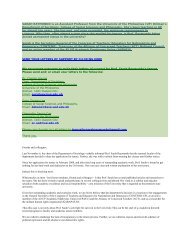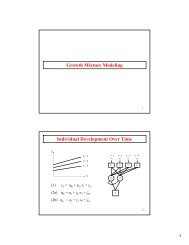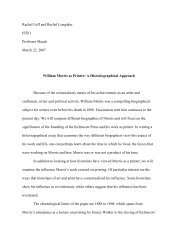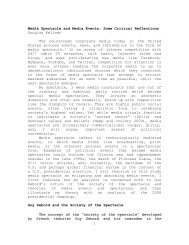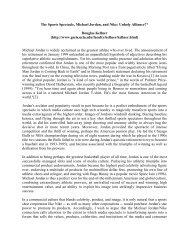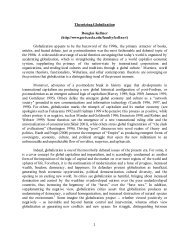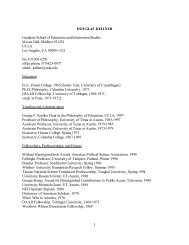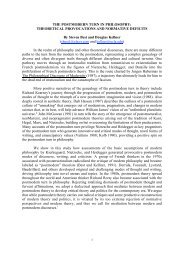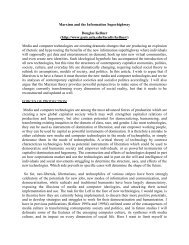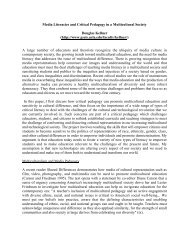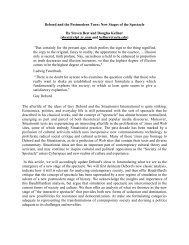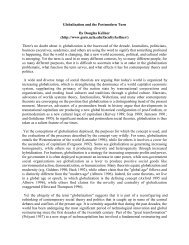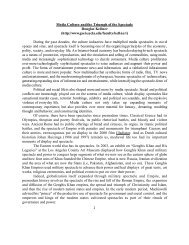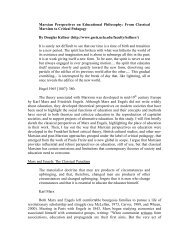Rap, Black Rage, and Racial Difference Steven Best and ... - UCLA
Rap, Black Rage, and Racial Difference Steven Best and ... - UCLA
Rap, Black Rage, and Racial Difference Steven Best and ... - UCLA
Create successful ePaper yourself
Turn your PDF publications into a flip-book with our unique Google optimized e-Paper software.
<strong>and</strong> careerism, the "white negro" finds passion <strong>and</strong> creativity in a far more vital black culture.<br />
From jazz to rock <strong>and</strong> roll to rap, many whites males have identified primarily with black music,<br />
language, dress, <strong>and</strong> style.<br />
Young suburban whites identify with rap because they too feel deeply alienated <strong>and</strong> rebellious,<br />
<strong>and</strong> like to identify with the "gangsta" image, such as "the wigger" subculture which appropriates<br />
the forms of black culture for oppositional white identities. As Ray Mazarek, the keyboard player<br />
for the Doors put it in a VH1 interview, without black culture, Americans "would still be dancing<br />
tippee-toe to the minuet." In fact, rap is a global popular with rap groups appearing on every<br />
continent in various languages <strong>and</strong> cultures. It is a product of the African diaspora, drawing on a<br />
wealth of African traditions <strong>and</strong> its rhythms, rhymes, <strong>and</strong> rebellions strike a responsive chord<br />
throughout the postmodern global village, suggesting the existence of a yet-to-be-organized<br />
Youth International of the disaffected. Especially "gangsta rap" flaunts disrespect for the<br />
authority, laws, <strong>and</strong> norms of white culture.<br />
As is clear in songs like Ice-T's "Mic Contract," the microphone is seen as a symbol of power, a<br />
phallic extension or gun, that enables rappers to engage in sublimated warfare. <strong>Rap</strong> reveals that<br />
the word "nigger" has been appropriated by African-Americans in various ways, either as a<br />
positive term of endearment <strong>and</strong> solidarity, as a term of hostility toward a peer, or as a political<br />
identity for a member of an oppressed class, such as when Ice-T insists in "Straight up Nigga"<br />
that "I am a nigger, not a colored man, negro, or black," terms widely accepted by white culture<br />
that euphemize the actual conditions faced by blacks, <strong>and</strong> which the word "nigger" refuses to<br />
tidy up.<br />
Much rap music attempts to communicate the plight of young blacks in the inner cities <strong>and</strong>,<br />
especially, to call attention to the problem of police violence which they confront on an everyday<br />
basis. While the police are supposed to "serve <strong>and</strong> protect," young blacks find instead that the<br />
cops are there to harass <strong>and</strong> exploit, <strong>and</strong> that these "guardians of the peace" in fact pose one of<br />
the gravest dangers to the community--as well dramatized in films like Menace II Society, or the<br />
Mark Fuhrman tapes during the O.J. Simpson trial which one African- American commentator<br />
described as an appropriate soundtrack for the Rodney King beating. In "Body Count," Ice-T<br />
satirically reflects on the white utopia of Ozzie <strong>and</strong> Harriet <strong>and</strong> the Cleavers, as a time <strong>and</strong> place<br />
where cops would help a kitten down from a tree. Nowadays, in the inner cities, Ice-T notes that<br />
"Shit ain't like that!" Every day, from L.A. to New Orleans, Philadelphia to New York, the<br />
complaints of the rappers are confirmed as white police have been caught beating <strong>and</strong> killing<br />
blacks, ordering their execution, imprisoning them on bogus charges <strong>and</strong> planted evidence, <strong>and</strong><br />
shaking down their communities for whatever blood money they can extort, often from the<br />
poorest of poor. To these conditions, N.W.A. dedicated their anthem, "Fuck tha Police!"<br />
Tupac Shakur's Me Against the World (1995) paints an especially vivid portrait of life in the<br />
inner city. Titles like "If I die 2nite" <strong>and</strong> "Death Around the Corner" describe the danger <strong>and</strong><br />
paranoia of living in no- peace zones where bullets fly more than birds, while "Me Against the<br />
World," "So Many Tears," <strong>and</strong> "Fuck the World" express both sadness <strong>and</strong> rage concerning this<br />
plight. Reminiscing about his past, he tells us:<br />
I was raised in the city,<br />
shitty ever since I was



